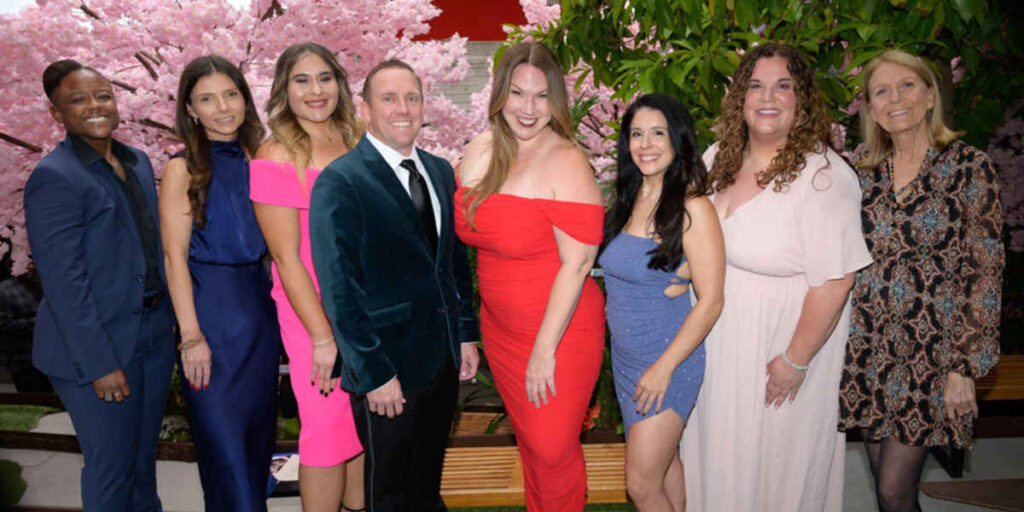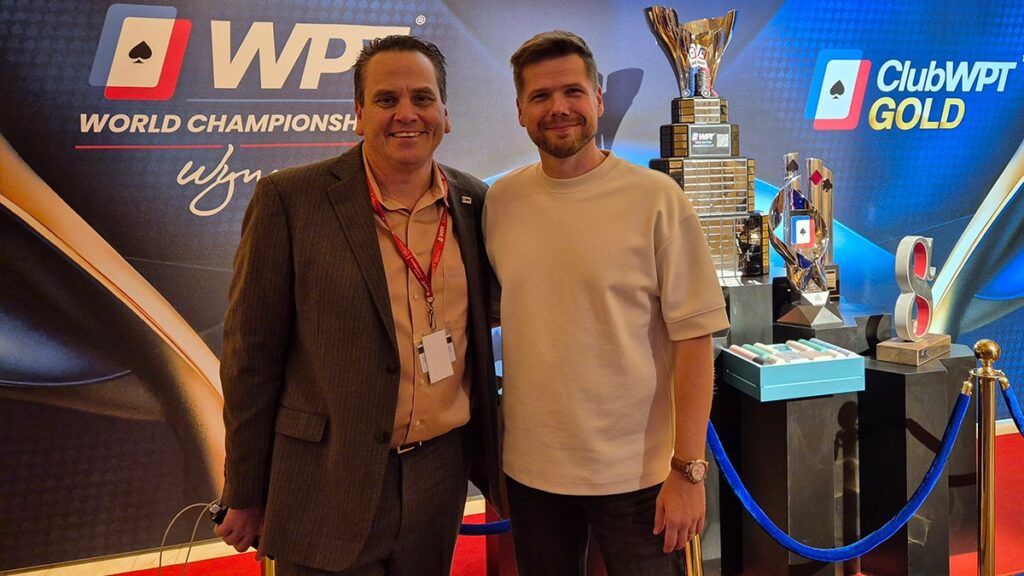When most people think of poker, they picture chips, bluffs, and big wins—not exonerations. But for attorney and longtime card shark Claudia Salinas, the game has become more than just a passion; it’s a platform.
As part of her work with The Innocence Center, Salinas is launching All In For Justice, a first-of-its-kind charity poker tournament on October 2nd at Jamul Casino & Resort in Southern California—fittingly on International Wrongful Conviction Day.
With every hand dealt, proceeds from the event will fuel the mission to free the innocent, prevent wrongful convictions, and support freed and exonerated clients after their release.
Please tell us about yourself and the Innocence Project
I was born and raised in Fresno, California. Because I always wanted to be a lawyer, I moved to San Diego to attend law school at California Western School of Law. Specifically, I wanted to go to a school with an Innocence Project.
At every Innocence Project location, people work to free the innocent, prevent wrongful convictions, and create fair, compassionate, and equitable systems of justice for everyone.
After passing the bar exam, I literally made myself indispensable at my alma mater’s California Innocence Project and later joined The Innocence Center, where I see myself staying for the long haul.
Please tell us about the Innocence Center
The Innocence Center is part of the Innocence Network, an informal coalition of independent innocence organizations dedicated to combating wrongful convictions worldwide and reforming the criminal legal system.
The goal of innocence organizations like ours is multifold. We work on preventing wrongful convictions. We want to get innocent people who have been wrongfully convicted out of prison. We educate the public on wrongful convictions, which can include teaching Continuing Legal Education courses and collaborating with community partners to raise awareness.
We envision a world where every juror sitting for a criminal trial has been told about the leading contributing factors to a wrongful conviction, such as government misconduct, eyewitness misidentification, and flawed forensic evidence.
Helping the public understand the leading causes of wrongful convictions, along with the underlying systemic flaws, human error, and social biases, can equip potential jurors to identify and prevent injustice from the outset.
The third part of our mission is to support exonerees as they reenter society; we help them rebuild their lives with the resources, guidance, and advocacy they need after wrongful imprisonment. All too often, the innocent are a news story for a day and forgotten.
Many of our exonerated people have unique needs, so we connect them to resources to help them get the help they need and strive to ensure they are set up for success for the rest of their lives.
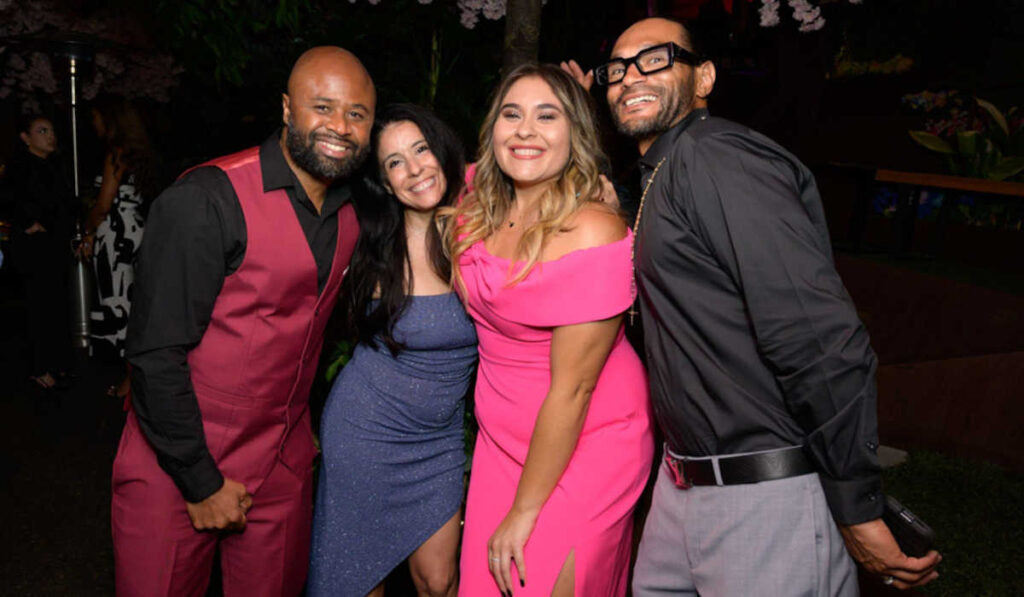
We’ve done a great job of having a national reputation for our expertise. If we can’t help someone because, for example, they’re out of our jurisdiction, we can connect the person with the appropriate resource.
We want to be there for as many people as possible, recognizing that sometimes impacted individuals don’t know where to ask for help. It can be very stressful for these people.
The Innocence Center is an independent non-profit corporation governed by a Board of Directors comprised of former California Innocence Project staff and alumni, as well as national advocates for criminal justice reform.
Notably, Amanda Knox, a prominent advocate for the wrongfully convicted, also serves on the board. We think it is important to have someone on the board who has suffered a wrongfully conviction and can provide that valuable perspective to the room where decisions are being made.
How do you feel about the Innocence Center?
In addition to the above, I personally believe that the Innocence Center has positioned itself to be sort of disruptive in all the best ways possible.
Specifically, we try to be innovative by embracing innovation and technology to identify cases, including using Artificial Intelligence and automation in our intake process. With our combined experiences, we truly have a keen ability to perceive the world in new ways, find hidden patterns, make connections between seeming disparate things, and develop creative solutions to advocate for clients.
For me, this work gives me a passive-aggressive way to hold the government accountable by exposing the flaws in the legal system through the lens of a case that is difficult to argue against.
Each year we receive hundreds of claims, which go through a rigorous multi-checkpoint review — beginning with our volunteer attorneys to our full team’s final approval.
By the time we’re in court, we not only believe in our client’s innocence but also have a clear legal path forward. After all, there’s no logical argument for keeping an innocent person behind bars.
Have you been impacted by federal budget cuts?
We are funded by generous donors and public grants, but we’ve recently received a termination notice for a federal grant that helps us free the innocent from prison.
However, the termination notice will not pause our mission. While we have a well-established annual gala to raise funds, this year, we wanted to find a new creative way to fundraise, hence the All in for Justice Poker Tournament.
How did your poker journey begin?
I actually started playing in 2014. I was into card games from a young age, but had not learned poker.
I was first introduced to poker when I was invited to go to a casino on a date. Then, within a short period, my then-boyfriend invited me to play in a tournament, and I final tabled. It was only 30 people, but nonetheless, I loved it.
When I love something, I tend to dive deep into whatever it is. I started reading books and watching YouTube. Fortunately, my boyfriend was also into poker, so it was a way to spend quality time together.
What I love most about poker is the social vibe and how it sharpened my competitive edge, skills I get to use every day as a lawyer.
For the first five years, I probably played three to five times a week, both in casinos and in a private league. Nowadays, I’m lucky to play two to three times a month, but that is simply because I am equally passionate about practicing law.
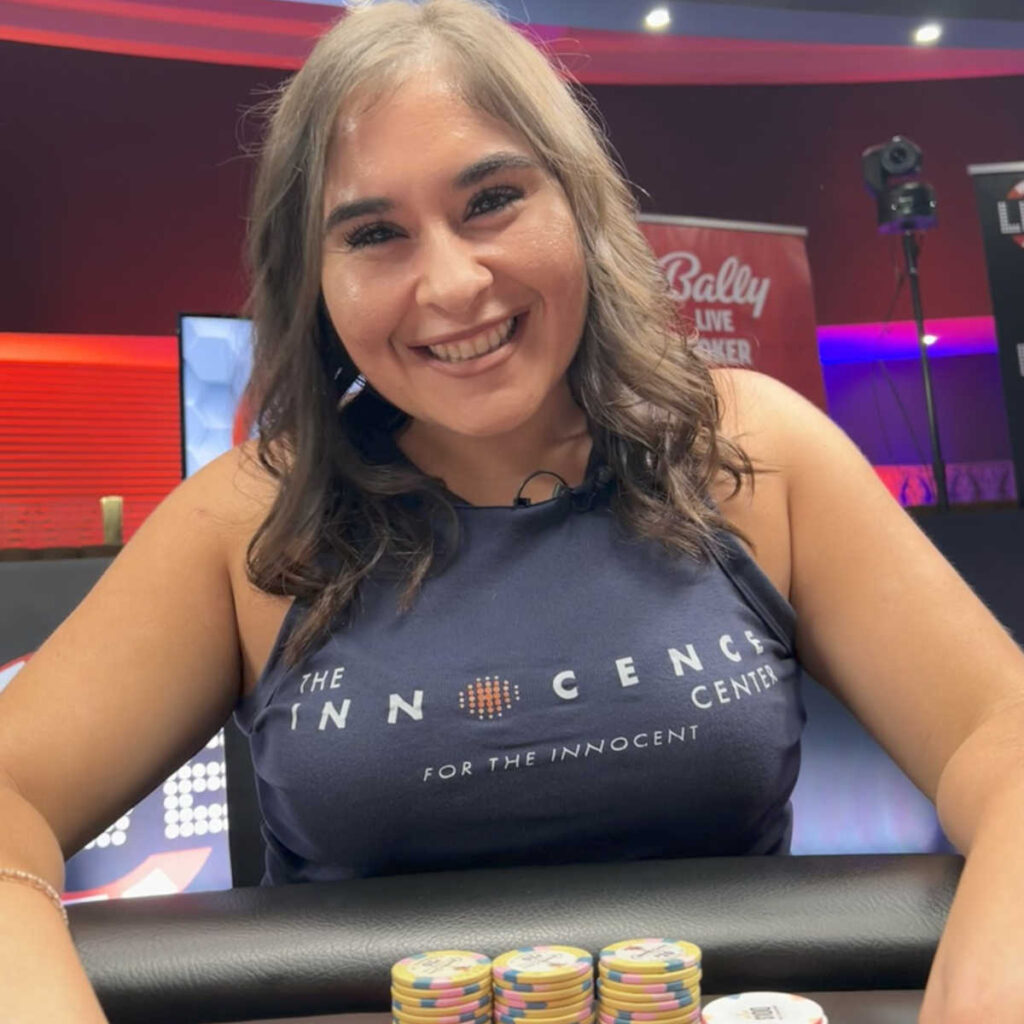
I truly believe that playing poker is a form of self-care, which is something that I am lucky my office prioritizes. If I have downtime on my business trips, my colleagues never fail to find card rooms for me to play in.
I am fortunate that they recognize the value of playing at a card table, because it provides a unique opportunity to raise awareness about wrongful convictions as well as connect with people who may want to support our work.
I find poker players to be incredibly generous and supportive. For example, through playing poker, I have been lucky enough to become good friends with Veronica Brill and Joey Ingram, who have been consistently supportive of my work and my well-being.
Because of those relationships, opportunities have truly opened up for me whereby I now have a platform and can make some magic happen with this upcoming charity poker event.
Walk us through the inaugural event All In For Justice, please.
This is going to be an absolutely great event. The big day starts on Thursday, October 2nd, at 6 p.m. at Jamul Casino and Resort in Jamul, California, just half an hour from San Diego.
Importantly, October 2nd is International Wrongful Conviction Day, so you’ll see events meant to raise awareness happening in cities in the United States and abroad.
Our event is going to be on the rooftop of the casino, where you can see the mountains and a brand-new, beautiful resort. At 6 p.m., when registration opens, we will be serving heavy appetizers for all players to enjoy before the tournament begins. There will also be a cash bar available.
During the networking period, players will have the opportunity to meet The Innocence Center staff and to hear directly from freed clients who will share their stories and how they were impacted by their wrongful conviction.
The buy-in for the tournament is $200 with unlimited rebuys available until the first break (level 6). An optional add-on for $100 is also available until the first break. Cards will be in the air by 7 p.m.
If you can’t play in the tournament yourself but want to help, we are looking for more sponsors so our clients can play for free.
You can sponsor a player for $200 or have the ability to donate any amount. It truly all makes a difference in this work. If you plan on traveling to come play, we have some good rates for the new resort, so message me directly on Twitter/X (@cisalinasss) or via email (Claudia@theinnocencecenter.org).
Poker players always want to know—what’s on the line? A trophy, prizes, bragging rights, or something else?
There will be a first-place trophy for the winner. We want to add to the player pool so there can be some cash prizes. The list of prizes is growing, and we have a couple of prize donations from various people and organizations.
Lena Evans donated her book, The Poker Powered Brain, and she will be there playing. Bet Rivers Sportsbook donated some hats, and you, Sara O’Connor, donated an electronic copy of your newest book, Shuffle Up and Deal With It: Tales from Dealers Worldwide.
Final table gifts are being provided by Suited Poker Gear and Poker League of Nations. Notably, Poker League of Nations, the world’s largest and most internationally represented women’s poker organization, will be awarding a Last Woman Standing prize.
Most importantly, every attendee can know that by playing, their proceeds go toward freeing someone from prison and supporting them after their release.
Tell us about your collaborators, Jamul Casino and Cheyanne Ivey, and how they helped bring this to life.
Jamul Casino and Resort is my home casino now that I live in San Diego, so that’s where you’ll find me. Both the casino management and poker management have been amazing and supportive of my work; they’re donating the space to us and the dealers to make it happen, which is amazing.
Cheyanne Ivey was posting about a charity poker event on Facebook, and I figured I would reach out to her, not thinking I would get a response. Within minutes, she responded and shared that she had a passion for the work that I was doing, as she had obtained some experience through interning at an innocence clinic in Florida, where she went to law school.
This line of work was near and dear to her heart for many reasons. Her grandfather taught her and Phil Ivey how to play cards, and he was a civil rights activist. So, naturally, she wanted to be involved.
Her business has helped with marketing and connecting me with people in the poker scene. She’s been great, and she even gave me a deck of cards signed by Phil Ivey and has plans to figure out a way to give another lucky poker player at the tournament a chance to get one!
You’ve also got gift sponsors like Suited Pocket Gear (SPG) and Poker League of Nations (PLON)—how did those partnerships come about and how are they supporting the cause?
That was all, Lena Evans, who is also from the San Diego area. She’s a huge philanthropist and has previously donated hygiene supplies for an event I was hosting at the San Diego County Bar Association to assist people experiencing homelessness.
For this tournament, she’s getting swag donated from SPG, and with PLON, she has an undisclosed prize for the last woman standing. Finally, she has donated her new book, The Poker Powered Brain.
For those who can’t make it in person, how can people get involved and support All In For Justice?
You can donate money or sponsor a client player via givebutter.com/TIC-All-InForJustice.
What impact do you hope this event has—not just in terms of fundraising, but also raising awareness within the poker community?
I hope this event not only helps sustain our work but also inspires the poker community to see themselves as part of the solution. Wrongful convictions are not rare—they are real, addressable, and could happen to anyone.
By raising awareness, we can show that every person, whether through advocacy, resources, or simply spreading the word, has the power to make a difference in freeing the innocent.
As an attorney, do you see parallels between the courtroom and the poker table?
Absolutely. I think of my great discussion with Jennifer Shahade on her podcast, The Grid, where she invited me to talk about this upcoming charity poker tournament.
As we all know as poker players, it is a game of missing information that you have to plug in. You study other people, make moves based on what you can and can’t do, and it’s up to us to figure out if our clients (or our poker hands) have a potential case (or winning chance) before we present it to the court (or the poker table).
Sometimes you have the nuts, or the best possible case. In other cases, you may not win the hand, but it could help another future hand, or case, out.
I love drawing parallels to the poker world. In law school, I wrote a scholarly article on how prosecutors use the death penalty as a bargaining chip, like one would in a high-stakes poker game.
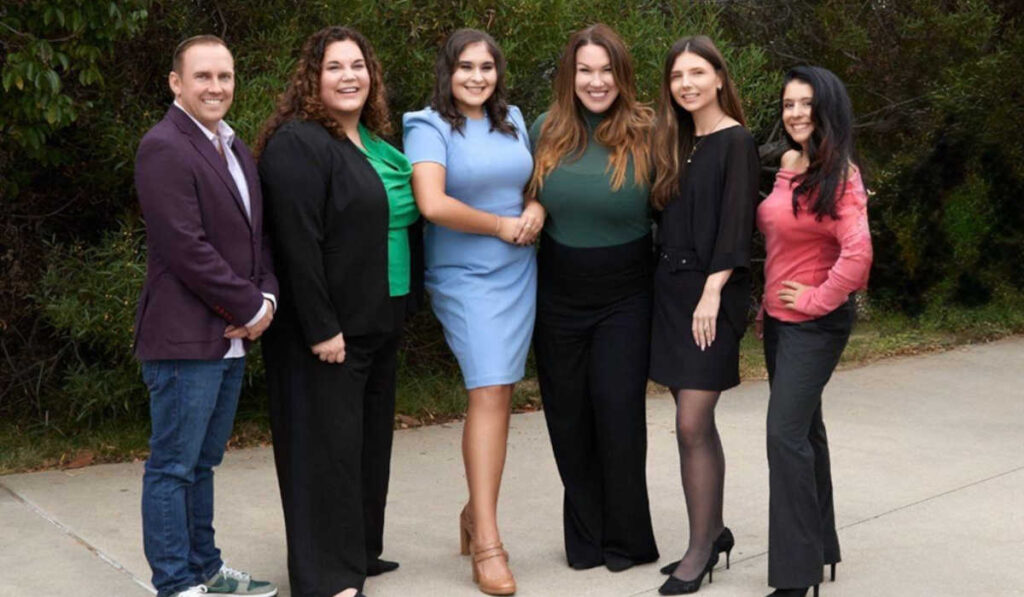
One of the examples in my writing was about the case of a woman who was wrongly convicted of murder and sentenced to death on a plea deal, which, most people would agree, isn’t a deal at all! In 2020, she walked out as a free woman after more than 26 years in prison for a crime she did not commit. In 2022, the district attorney’s office agreed to vacate her conviction.
But in my scholarly article, I drew parallels to the district attorney using the death sentence as a bargaining chip to scare people, like the woman in my article, into taking plea deals.
It appears that in some cases, prosecutors may file charges carrying higher potential penalties with the knowledge that defendants might be more likely to accept a plea rather than risk going to trial. In poker terms, the big stack—the prosecutor—can sometimes feel like the big bully at the table.
They have the power to pressure others into making tough decisions, and just like in a poker game, the smaller stacks—the defendants—may feel forced to fold or settle rather than risk going head-to-head against someone with a clear advantage. As we poker players know, the “big stack” is a powerful position.
If someone famous from the law joined the charity tournament, who do you think would make the toughest opponent?
I would say Kim Kardashian. She has played poker before, has the resources to make bold moves, and brings a certain distraction factor to the table.
Most importantly, she has shown interest in innocence work, and I would love to get her involved in California. It would be amazing to play a hand or two with her.
If you could build your dream charity poker table, who would you want to sit with—poker legends, celebrities, or even past clients?
I would for sure love to play poker with Kevin Hart, because he plays and is hilarious. I would have Veronica Brill there, because she got me on my first big live stream, and we could clean up the table together. I would bring Phil Ivey to the game, so that I could talk to him about his grandfather.
I want all my friends there, so Joey Ingram should come and report on the story afterwards.
I have always looked up to Supreme Court Justice Sonia Sotomayor, and I heard somewhere that she plays poker. I would love to have her join my celebrity poker game as well. Then, I can pick her brain about becoming a Supreme Court Justice!
Additionally, let’s add Justin Bieber, because he was a crush of mine who I’ve seen at a poker table before. Finally, I always want to stack the table with powerful women, so let’s add two Jennifers: Jennifer Shahade would be a lot of fun, and Jennifer Tilly is a hilarious blast!
What do you hope players will walk away with after All In For Justice—beyond just the cards and chips?
I want players to walk away with a deeper appreciation for the complexity of people’s lives and the understanding that things are not always as they appear.
Wrongful convictions are a reality, and I hope attendees leave with the awareness to carry this knowledge into the jury box—and the responsibility to share that understanding with others who may one day decide someone’s fate.
I also want people to leave feeling empowered, knowing that every action—whether attending, giving, or even sharing a post—compounds to create real change. Together, those small steps build the momentum that frees the innocent.
Conclusion
Poker teaches us that every chip, every decision, and every hand can change the course of the game. For Claudia Salinas, those same principles apply far beyond the felt. With All In For Justice, she’s proving that the poker community’s trademark boldness and generosity can do more than win pots—it can win back lives.
On October 2nd, players won’t just be chasing trophies or prize pools; they’ll be helping to flip the script for people who didn’t get a fair shot in court. And as any seasoned player knows, sometimes the biggest wins aren’t measured in chips, but in second chances.
Consider channeling your competitive spirit for a cause that’s bigger than the game. Pull up a seat, shuffle up, and help change the odds—one hand at a time at All In for Justice’s inaugural event.
